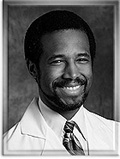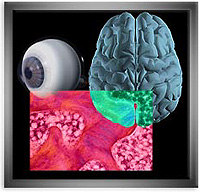BY JONATHAN GALLAGHER
 itting in his study with Baltimore neurosurgeon Ben Carson,* I engage him in conversation, and the discussion turns to the subject of evolution and origins. As we face each other between the erudite tomes on the bookcase and the modern technological equipment on the desk, it feels appropriate to think about who we are and where we came from.
itting in his study with Baltimore neurosurgeon Ben Carson,* I engage him in conversation, and the discussion turns to the subject of evolution and origins. As we face each other between the erudite tomes on the bookcase and the modern technological equipment on the desk, it feels appropriate to think about who we are and where we came from.
Carson: Like this computer: If you came into this room and saw the computer, you wouldn't think it had just happened. It didn't come about by random events.
JG: So why do so many people prefer to believe in the random formation of the  universe--and of life itself? Or to put it another way, Why is the matter of evolution so important?
universe--and of life itself? Or to put it another way, Why is the matter of evolution so important?
BC: It comes down to a matter of ownership. Who owns the universe, who owns the earth, who owns your life? Those who believe in evolution, and in a naturalistic explanation of the universe, ultimately see themselves as end-owners--as the creator and ultimate source of authority. In this way they answer to nothing and nobody, for there is nothing higher than themselves.
How does this happen? What are the consequences of accepting evolutionary views of human origins? How does this affect society and the way we see ourselves?
By believing we are the product of random acts, we eliminate morality and the basis of ethical behavior. For if there is no such thing as moral authority, you can do anything you want. You make everything relative, and there's no reason for any of our higher values.
If we are all the product of chance, the random assortment of atoms, living in a deterministic universe that is simply the consequence of physical interactions, doesn't it all seem so futile?
Yes, in my education I had to learn evolutionary theories, and as a God-fearing Christian I wondered how to make God and evolution mesh. The truth is that you can't make them mesh--you have to choose one or the other.
Too many Christians have given up too much to "science," conceding not just the observed data but the anti-God interpretations. Are you often questioned about being both a logical scientist and a Christian?
Yes, my answer is that the more you understand science, the less you can believe all this is an accident! Just look at the brain, with its billions and billions of neurons, and 100 billions of connections, and how it remembers everything it has ever seen and heard . . .
Everything? This does not seem to be a correct portrayal of my brain at least! I'm forgetting things all the time.
Put a probe on the hippocampus of an 80-year-old man, and he can tell you verbatim the words of a book he read 60 years ago. This is a highly complex and sophisticated organ. Not a likely result of chance processes.
Not even by slow degrees?
Even if you allow the formation of a single cell. And a single-celled organism is also amazingly complex--the cell membranes, the nucleus, the nucleolus, the mitochondria. . . . Plus, we give evolutionists too much if we start with a single cell. Try starting with inert substances!
But just supposing you did have that first cell?
Even if you accept evolutionary theory--developing a more sophisticated organism in this theoretically "logical" fashion, then there should be a continuum of organisms. And why did evolution divert in so many directions--birds, fish, elephants, apes, humans--if there is some force evolving to the maximum? Why isn't everything a human--a superior human? Darwin specifically stated that his theory hung on the discovery of intermediate forms, and was sure that we would find them. More than a hundred years later we still haven't found them. Even the earliest fossils don't show such intermediates.
 Take the simple case of ape to human. It should be easy to find abundant fossil remains since, according to evolutionary theory, this is the most recent transition. If we can find so many fossils of dinosaurs, which are further back in the evolutionary scheme, we should have plenty of evidence of intermediates between apes and humans. But we don't have them. We have very few supposed intermediates--like "Lucy," based on fanciful reconstruction with a lot of filling in. Today we have people with significant congenital abnormalities whose skeletal remains would seem like a missing link. So "Lucy" does not make the case, and there should be multiple "Lucys" if the transition from ape to human were true.
Take the simple case of ape to human. It should be easy to find abundant fossil remains since, according to evolutionary theory, this is the most recent transition. If we can find so many fossils of dinosaurs, which are further back in the evolutionary scheme, we should have plenty of evidence of intermediates between apes and humans. But we don't have them. We have very few supposed intermediates--like "Lucy," based on fanciful reconstruction with a lot of filling in. Today we have people with significant congenital abnormalities whose skeletal remains would seem like a missing link. So "Lucy" does not make the case, and there should be multiple "Lucys" if the transition from ape to human were true.
Also, there's the whole subject of irreducibly complex organisms--the idea that everything has to be there all at once for it to work. How could all the complex items evolve simultaneously--as in the eye, for example?
Would so many scientists who disagree with your views be a concern to you? After all, 99 percent may say you're wrong!
Before Darwin most scientists were Christian. Even Darwin was brought up a Christian, but he became embittered. He set out to prove another explanation to life. I have to give the man credit--he was a powerful observer. On the Galápagos Islands he found thick-billed finches whose bills were capable of breaking apart hard seeds. He also discovered iguanas and tortoises with different adaptations. Therefore, he concluded that these organisms were evolving, and he was right in terms of microevolution--adaptation to the environment. Imagine if you only got fed if you could dunk a basketball . . .
(Now I was really wondering where he was going with this one! Evolving basketball players? But then he made a telling point.)
Only tall people would be fed and would survive. They would pass on their tall genes to their offspring. Is this evolution or adaptation? Obviously it's the latter. But evolution means one organism eventually changing into another quite different, and there's no evidence for such change. God allowed for adaptation, which speaks of a wonderful Creator who gave His creatures a genetic structure flexible enough to adapt. But that's not evolution.
(Then we turned the conversation heavenward.)
Look at the complexity of the universe, too. The Hubble telescope has revealed much more to us. But our galaxy is just a tiny dot in the great scheme of the universe, and there's much more beyond what we know. Even in our own solar system--we orbit 93 million miles from the sun. If it were 92 million miles, we'd be incinerated; 94 million miles, and we'd be a frozen iceball. There's so much--it's all so extraordinarily organized with such complexity. How does that happen?
Then take the ideas of the origins of the universe. The scientists speak about the second law of thermodynamics, which states that everything tends toward a state of disorganization . . .
(Maybe he has seen my desk, a stray thought occurs to me as it streaks across my brain!)
So how could our incredibly organized universe come about as the result of a big bang? This flies in the face of the second law, which says it would be less organized as a result, not more! Scientists have to be consistent.
A few closing thoughts?
Ultimately, if you accept the evolutionary theory, you dismiss ethics, you don't have to abide by a set of moral codes, you determine your own conscience based on your own desires. You have no reason for things such as selfless love, when a father dives in to save his son from drowning. You can trash the Bible as irrelevant, just silly fables, since you believe that it does not conform to scientific thought. You can be like Lucifer, who said, "I will make myself like the Most High."
Can you prove evolution? No. Can you prove creation? No. Can you use the intellect God has given you to decide whether something is logical or illogical? Yes, absolutely. It all comes down to "faith"--and I don't have enough to believe in evolution. I'm too logical!
_________________________
*Ben Carson is the director of pediatric neurosurgery at Johns Hopkins Hospital in Baltimore, Maryland.
_________________________
Jonathan Gallagher is the United Nations liaison for the Seventh-day Adventist Church, with headquarters in Silver Spring, Maryland.


